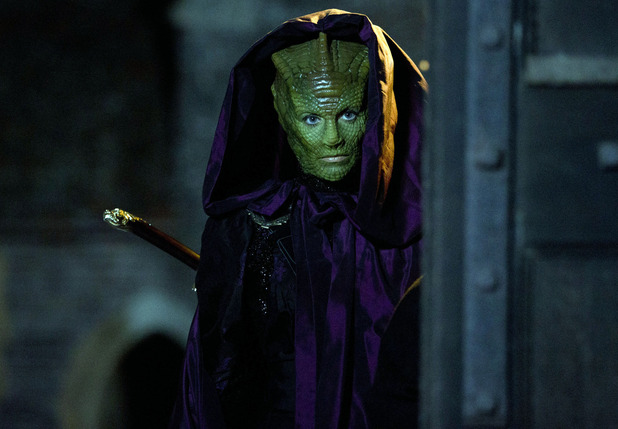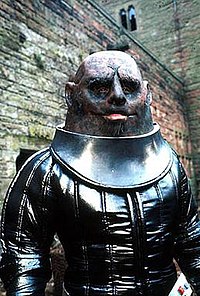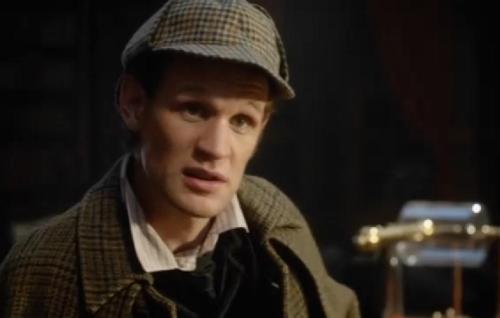STORY 234: THE SNOWMEN
The Snowmen is perhaps the best pilot for a spin-off I've seen, given that the secondary characters of lizard-like alien Madame Vastra (Neve Macintosh) and her Victorian-era human lesbian lover Jenny (Catrin Stewart) are infinitely more important than the former lead character of The Doctor (Matt Smith). The Snowmen has the return of the Great Intelligence, which is a villain not from the mind of writer/producer Steven Moffat (which must come as a shock to his sycophants) but from the Yeti stories of the Second Doctor era: The Abominable Snowmen and The Web of Fear. What it doesn't have is the need for the Doctor. In many ways, the Doctor seems to merely be in the way of the Vastra/Jenny/Sontaran Strax (Dan Starkey) fun-and-games. In short, for all it's worth he might as well have remained up in his cloud.
It's 1842 and a little boy is making a snowman. He's a solitary little chap who thinks the other children are 'silly'. As it happens, the snowman thinks so too...and tells him so. Soon we go fifty years, and little Walter has grown to the sinister Dr. Simeon (Richard E. Grant). He is the servant of the Intelligence or Great Intelligence (voiced by Ian McKellen), who is none-too-subtle about who he is (given the bad doctor's calling card literally reads G.I.).
We then get a look at ye olde Victorian wench Clara (Jenna-Louise Coleman), who is puzzled by the sudden appearance of a snowman. The passing wanderer cares not about this phenomena, but our persistent serving-wench jumps on his carriage and asks those immortal words, "Doctor Who?"
The Doctor tries to get Clara to forget they met via a Memory Worm (I suppose those devices from Men in Black weren't available), but that comic Silurian Strax keeps making a right mess of it. The Doctor doesn't care about anything, least of all Clara Who...which leads her to reply "Doctor Who". She however, manages to follow the Doctor up to his Castle on a Cloud...or TARDIS on a Cloud...but runs off before he finds her.
Our Clara all but magically changes from ye olde Victorian bar-wench to the veddy proper Victorian governess Miss Montague. She watches over two children, Digby (Joseph Darcy-Alden) and his sister Francesca (Ellie Darcy-Alden...wonder if they're related). Francesca has been having nightmares about her previous governess, who drowned in the pond (emphasis mine) coming back to punish her on Christmas, which is that very night. Digby suggests she needs a Doctor...
With that, Clara returns to where the TARDIS on a Cloud was, shouting for him. Coming upon this odd scene is Jenny. Clara tells her she needs to speak to the Doctor, to which Jenny replies, "Doctor Who?" Jenny then takes her to meet the star of The Snowmen...
...and they have a most interesting conversation where Vastra puts her to The One-Word Test. What is that one word that will bring the reclusive Doctor out of retirement to save the world? Vastra tells him that One Word, which reawakens him from his enforced metaphorical slumber...
POND!
I suppose technically the fact that the estate's pond remains solidly frozen while everything else has thawed is what Clara was referring to...or IS IT? The Doctor goes to where Clara works and quickly things happen: the Ice Governess comes alive to terrorize the children, the Doctor finds things exciting again, the Companion dies (sort-of), the Great Intelligence tries to win but can't, something outside the Doctor saves the world, Doctor bids farewell to Clara and at her funeral realizes that the same Clara Oswin Oswald was the SAME Oswin from Asylum of the Daleks! She's The Girl Whose Died Twice (wonder if she's related to Rory Pond...Williams...Whatever). We end in present-day where a girl not unlike Clara/Oswin is wandering that same graveyard. She's not afraid of ghosts. Now the Doctor has a mission: to find this girl.
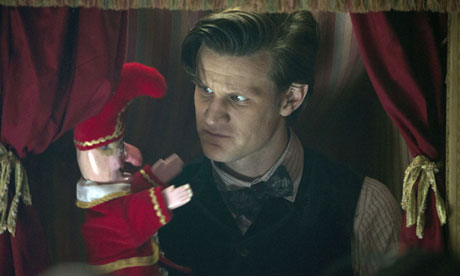 |
| He's With Stupid |
The plot of The Snowmen was described thus by my DVR: 'Though saddened by the loss of his companions (sic), the Doctor helps a young governess battle a frosty menace". I don't know if they were intentionally or not trying for a pun but I took it as unintended comedy. For myself, while I did find some good things within The Snowmen, it's just another in the sad and sorry disappointments of the Moffat-Smith Era I have endured.
Let's start with the dominance of the secondary characters. For the first half of The Snowmen the Doctor isn't a player in any of it. I know it's because he is now a recluse, but because of this the slack has to be picked up by Vastra, Jenny, and Stax: three characters the NuWho fans have inexplicably gone mad for (why secondary characters who were in River's Secret Part I: A Good Man Goes to War for less than fifteen minutes are suddenly iconic I know not) but who basically take over the story. That perhaps might be forgiven if there was anything good about them, but there simply isn't. Again and again I am puzzled why so many NuWhovians appear to be celebrating same-sex bestiality. Madame Vastra is a know-it-all (hints of River Song), Jenny is basically a tart, and Strax...well, poor Strax. Poor, poor Strax.
The Silurians were once a feared enemy of the Doctor. Making their debut in The Time Warrior (which also was the debut story of Elisabeth Sladen's Sarah Jane Smith), they became fierce foes to the Doctor, even having managed to invade Gallifrey itself in The Invasion of Time. However, now this once proud warrior species has been reduced to comic relief, a figure of ridicule more than menace. Strax, more than any other Sontaran, has shifted the image from that of a committed foe to that of a dimwit who doesn't quite get the social manners of humans or any other species.
Perhaps that's what NuWho fans want, but somehow it doesn't ring true. It turns things into a joke when perhaps the Doctor might have called for a Sontaran's fighting ability, especially one that is willing to help him. The entire scene between Strax, the Doctor and Clara goes on for far too long and is nowhere as funny as Moffat or Smith think it is. Comedy is OK so long as it adds something to the story or grows out of it (example: The Romans). Given that it was neither, the whole sequence should have been cut tremendously.
Going on to Madame Vastra and Jenny, I still fail to comprehend why their relationship (one of the most twisted in Doctor Who history) is so beloved. We can't quite leave aside the fact that it's a lizard involved in a sexual relationship with a human. However, we'll try as apparently Jenny is so in love with Vastra that she doesn't seem to mind that her 'wife' drinks human blood. When Clara and Vastra meets, she doesn't straight-up say she's drinking blood but intimates as much. We can also leave aside the idea that it is impossible for these two to be married in any legal sense of the word: WHO would marry them, HOW?
The thing about Vastra and Jenny is that they simply aren't interesting. Other than the fact that it's a Silurian in Victorian London hooking up with this slinky Cockney, they don't appear to be clever (the mystery of the snow having been solved off-screen) or particularly important to the story. Instead, they do serve the purpose of drawing attention and time away from the Doctor. It was his show once, and once HE would have been leading the case. Now, he's reduced to being Punch (and a bad one at that).
There are moments of astonishing stupidity in The Snowmen that boggle the mind as to how they would have released it the way it was broadcast. We already have this "Doctor Who?" business that by now should be retired. There were four, FOUR uses of something a child might find amusing but that is by now simply tiresome, even silly. However, for sheer unintended (we hope) laughter, we have to go to when the Doctor and The Great Intelligence meet.
We begin this with the G.I. saying, "Danger. Danger. There is danger here". Hearing, "danger, danger", I did expect for the Great Intelligence to call out for Will Robinson. Perhaps Lost in Space wasn't as popular in the U.K. as it was in the U.S., but it still sounds odd at the least to hear "danger, danger" ringing out throughout the cavernous institute Simeon is at.
To add an even more bizarre (or perhaps self-serving) element, we have the Eleventh Doctor doing what he does best...look foolish and not taking anything seriously. Simeon's manservant rushes into the laboratory saying that he has a caller...Sherlock Holmes. In comes in Matt Smith, complete with pipe, dazzling us with that Moffat-Smith humor we've come to detest.
Making things even worse is Moffat/Smith's penchant for deliberately trying for laughs when the situation doesn't call for them. When the Great Intelligence confronts the Doctor about not being from this world, the Doctor's reply is "takes one to SNOW one".
I don't hear a rim shot.
There isn't anything wrong with having a Doctor unafraid: the Fourth would offer jelly babies to his adversaries. However, there is laughing at the face of danger and being downright stupid. Smith's Doctor constantly crosses that line by A.) ceding the spotlight to others (be they River or Vastra) and B.) by appearing to not realize that he is facing a serious threat...well, perhaps when you're being menaced by snow and ice, maybe not so much.
The fact that Steven Moffat is also the producer/writer of the updated Sherlock I suppose has very little to do with this get-up. There is a lot of mentioning in The Snowmen of Holmes and his creator. Dr. Simeon states that Dr. Doyle has more than likely based his stories on Vastra and Jenny (changing a few things of course). This doesn't seem likely given that the first Sherlock Holmes story, A Study in Scarlet, was published in 1887 (a full five years prior to the events in The Snowmen) and despite all claims to the contrary Madame Vastra and Jenny are never actually seen investigating anything, let alone using reason or logic to deduce the mysteries they investigate. Furthermore, what we think of as the Sherlock Holmes look didn't originate from the stories themselves, so the deerstalker cap and cape seems a bit anachronistic.
Of course, I could speculate that Sherlock has some homoerotic undertones in the Holmes/Watson relationship in the same way Vastra/Jenny celebrate their own unholy union, but then again, that is speculating without having all the data.
Regarding the guest stars, it seems that an opportunity was lost when they gave Grant and McKellen little to do. What a great twist it would have been to find that Dr. Simeon wasn't the brains of the operation, but it was an old foe. Grant looked menacing, I'll give him that, but like the Doctor never played a major role in the entire scheme.
Now, let's move on to some good things in The Snowmen (and there are). The interplay between Vastra and Clara is good: the former's directness matching the latter's, their one-word series of interviews well-played thanks to director Saul Metzstein (not often I say that...Pond Life, anyone). As for Coleman, she was strong as the Victorian working-class/posh girl, though I personally wish that she had been strictly one or the other. The reasons as to why this Cockney was masquerading (successfully so) as a governess we know not, and we could have dispensed with that angle.
I also note that Clara has the same Doctor problem almost all NuWho Companions have: she's got the hots for him. They've only met and in the middle of all this chaos she goes and gives him a passionate kiss. Why? Well, no time to answer that: we've got an Ice Governess to fight, one who keeps shouting, "That's the way to do it," and who frankly isn't terrifying (although Clara's death was sad...illogical that her body would have remained beautiful after falling thousands of feet, but sad nonetheless).
One thing that perhaps IS frustrating is that now we have this puzzling mystery as to who Clara is. She dies in The Snowmen (rather gruesomely and needlessly I thought) and Oswin (who is suppose to be the same person) dies in Asylum of the Daleks. We already get there is a connection when Clara comments on how much she likes making soufflés, and the Doctor establishes that Oswin and Clara are one and the same. That on the surface appears impossible: how does a Victorian end up serving on a spaceship? How it will be resolved will make or break this season.
However, here again we have a Companion-centered story rather than a Doctor-centered story. This is something I don't understand and which has plagued the NuWho since Rose: whether it's about Rose Tyler or Donna Noble or River Song or Amy Pond or now Clara Oswin Oswald, when are we going to return to stories about the Doctor?
There was a lot of comedy in The Snowmen (screaming maids, Strax's continued befuddlement, the Sherlock quasi-crossover), there were nice sets. What for me The Snowmen didn't have were: a successful resolution (really, crying saved the day? Nothing the Doctor did?), a shift away from the Doctor to Vastra/Jenny/Strax, a comical villain (when the Ice Governess came out, I thought they were being attacked by Mrs. Butterworth), and nothing that would interest me from revisiting The Snowmen.
Truth be told, I'm finding Doctor Who to be losing its magic. Perhaps they can borrow that old silk hat from Frosty...
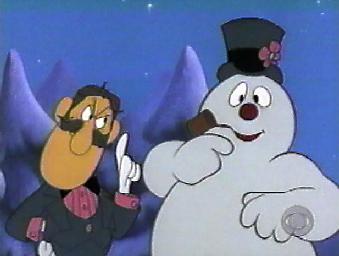 |
| Dr. Simeon Instructs His Minions... |
2/10
Next Story: The Bells of Saint John

